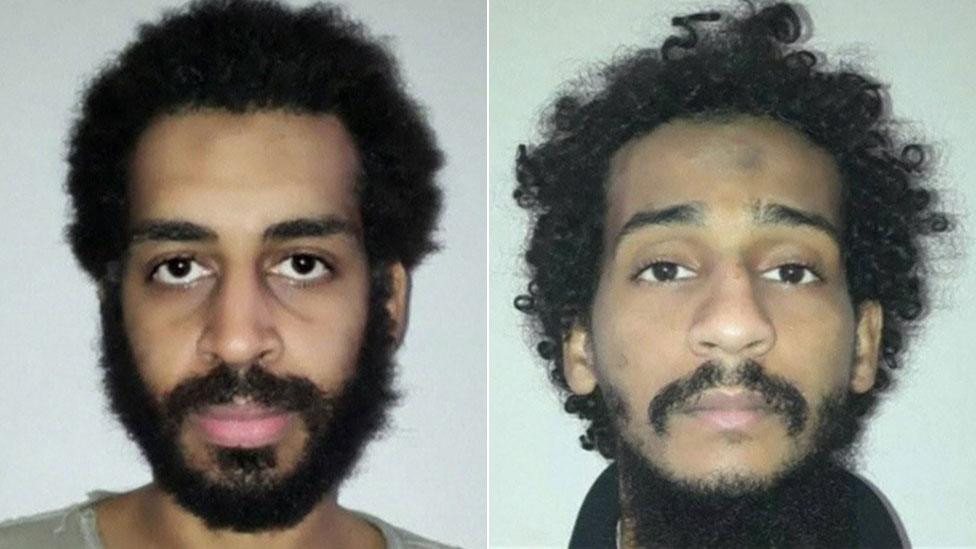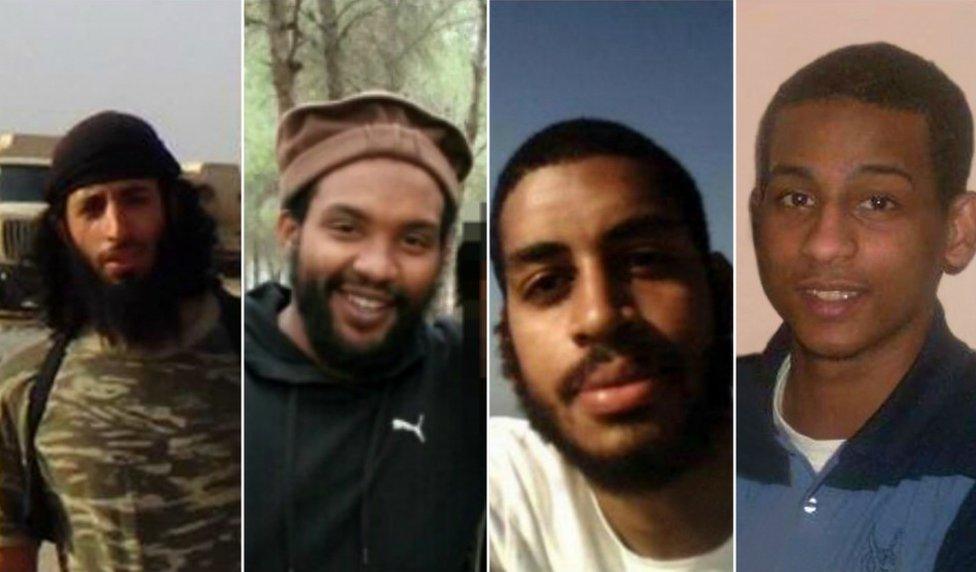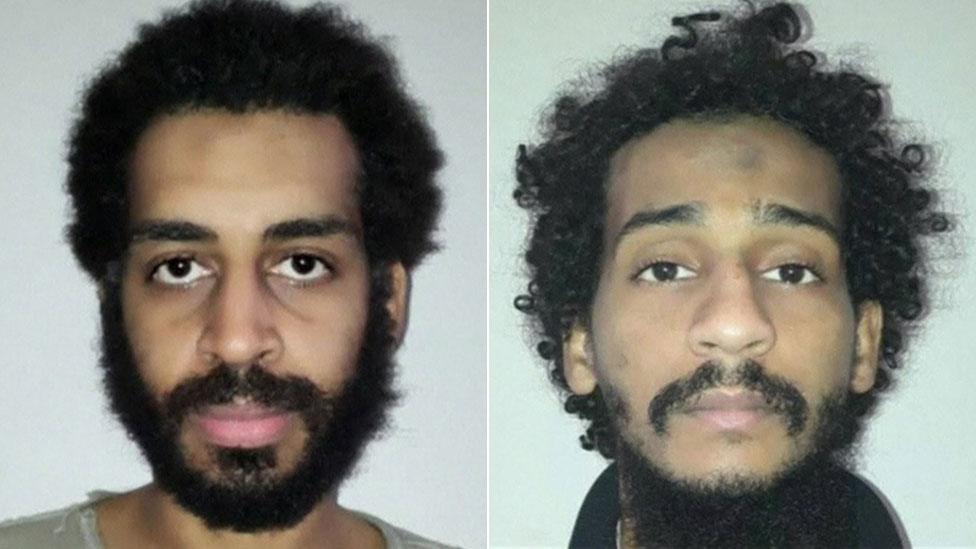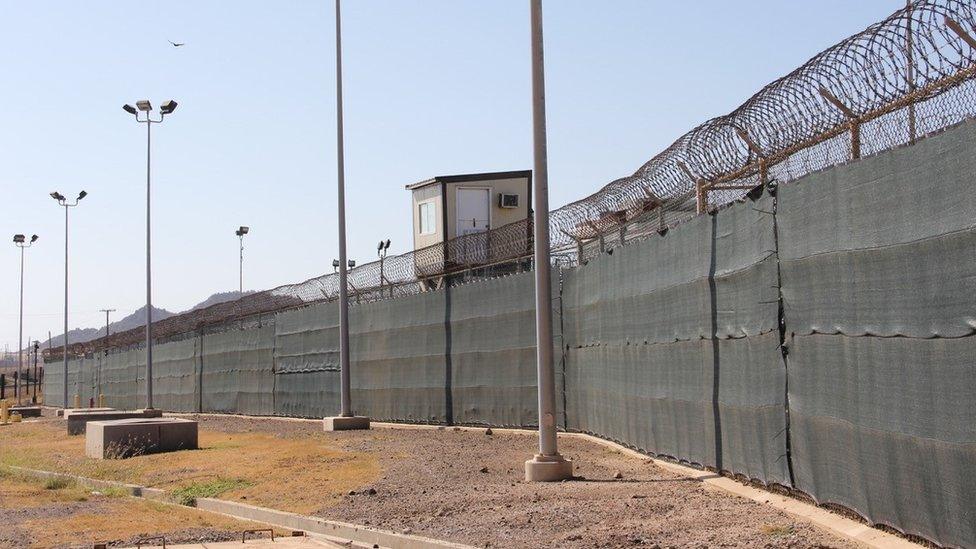Islamic State 'Beatles' duo: UK 'will not block death penalty'
- Published

Alexanda Kotey (left) and El Shafee Elsheikh were captured by Syrian Kurdish forces
The UK would not oppose the use of the death penalty if two alleged Islamic state members were extradited to the US, the home secretary says.
In a letter leaked to the Telegraph, external, Sajid Javid said he would seek no assurances about the sentences.
Alexanda Kotey and El Shafee Elsheikh, from west London, were captured in Syria in January.
Labour said the UK had "unilaterally abandoned" its opposition to the death penalty.
For years Britain sought assurances from foreign governments that the death penalty would not be used in cases where the UK provided information or extradited suspects.
Number 10 said it was "a long-standing position of the government to oppose the death penalty in all circumstances as a matter of principle".
But it added that in this case it was "a priority to make sure that these men face criminal prosecution".
The PM was aware of the letter and discussions with the US on this issue were continuing, Number 10 said.
The two men are accused of being the last two members of an IS foursome dubbed "The Beatles" because of their British accents.
Earlier this year, in an interview with Associated Press, they complained that they would not get a fair trial because the UK government had stripped them of their British citizenship.
The BBC's security correspondent Frank Gardner said a senior British government official told him that this case was not the first time that the UK had dropped its request for assurances that the death penalty would not be used.
But our correspondent said if the pair were sent to the controversial US military prison Guantanamo Bay - where suspects have been detained without trial - the UK would withhold intelligence.
"It's got a lot: the Metropolitan Police has spent four years gathering intelligence on them," he said.
In the letter to Jeff Sessions, dated 22 June 2018, Mr Javid wrote that the UK would not seek "assurances" over the death penalty in this particular case, but said it did not mark a change in UK policy.
"I am of the view that there are strong reasons for not requiring a death penalty assurance in this specific case, so no such assurances will be sought," he said.
But the former independent reviewer of terrorism legislation, Lord Carlile, described the letter as "extraordinary".
"We do not extradite people to countries where there is a death penalty unless there is an assurance the death penalty will not be carried out," he told the BBC.
"This a unilateral change of policy without any consultation and I would be amazed if this had been approved explicitly by the prime minister."

Who are the IS suspects?
By Frank Gardner, BBC security correspondent
Four years on from the summer when IS jihadists in Syria uploaded their gruesome beheading videos the ramifications of those actions continue.
Hostages who survived captivity in the hands of IS have spoken of a gang of four western jihadists nicknamed the Beatles.
None of them brought any military skills to the battlefield yet they were said to have been particularly sadistic in their treatment of western prisoners.
The US and Britain believe that the remaining two members of the gang are Alexanda Kotey and El Shafee Elsheik,.
After reportedly being stripped of their UK nationality by the Home Office, they have been in a legal limbo since being captured by Syrian Kurdish forces in January.
Relatives of former hostages are extremely keen to see them face trial for their alleged crimes.

Shami Chakrabarti, Labour's shadow attorney general, said Mr Javid had "secretly and unilaterally abandoned Britain's opposition to the death penalty" and appeared to be encouraging "this grave human rights abuse".

Left to right: Mohammed Emwazi, Aine Davis, Alexanda Kotey and El Shafee Elsheikh
Diane Foley - whose son James, an American journalist, was beheaded by the IS cell in Syria in 2014 - told BBC Radio 4's Today programme that she was "very against" the death penalty for the pair.
"I think that will just make them martyrs in their twisted ideology," she said.
"I would like them held accountable by sending them to prison for the rest of their lives."
And Amnesty International called Mr Javid's decision a "deeply worrying development".
Former home secretary and Labour peer Lord Blunkett warned that Mr Javid could be setting a precedent.
He told BBC Radio 4's The World At One programme: "Once you have made an exception, then where do you go? The home secretary making individual decisions on individual cases is a very, very bad principle."
A spokeswoman for Theresa May said: "The decision was taken by the home secretary and the former foreign secretary following the advice of lawyers and officials. The PM was made aware of the decision."
Asked several times whether the prime minister "approved of" the decision, the spokeswoman repeated that Mrs May "was aware" of it and said: "We are continuing to engage with the US on this issue."
Kotey and Elsheikh were members of the IS cell with two others from west London - Mohammed Emwazi, nicknamed "Jihadi John", and Aine Davis.
The group were radicalised in the UK before travelling to Syria, where they became infamous for their executions of Western hostages.
Emwazi, who was the alleged ringleader and appeared in videos showing hostages being beheaded, was killed by a drone strike in 2015.
Davis was convicted of being a senior IS member and was jailed in Turkey last year.
Kotey and Elsheikh were captured by members of the US-backed Syrian Democratic Forces (SDF) in January.
- Published20 February 2018

- Published10 February 2018
